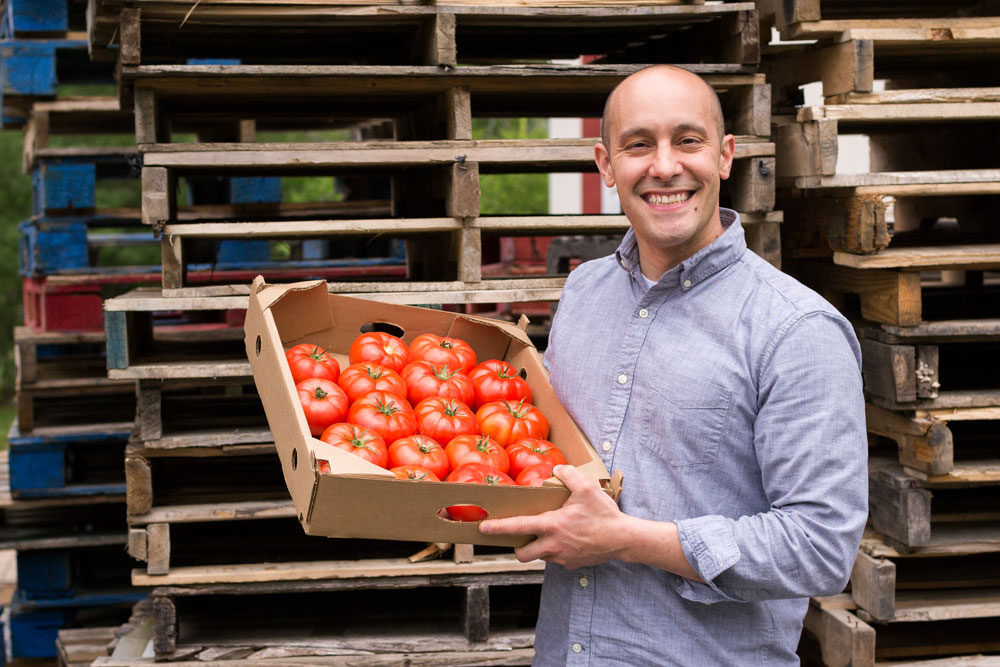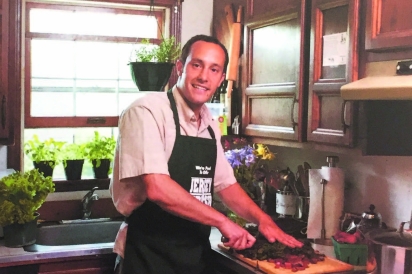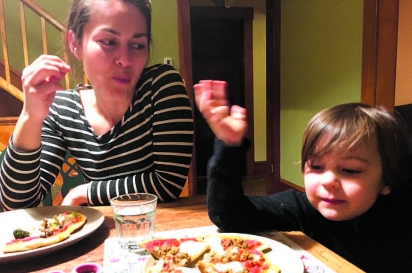IN THE KITCHEN (10 YEARS LATER)
Connecting farm and fork with Mikey Azzara of Zone 7
To sit with Mikey Azzara for any length of time is to watch his mind at work. You sense that he is zooming in and out between macro- and micro-level details, considering them with equal intensity. He’s a man who thinks before he speaks. This makes sense. For Azzara’s company, Zone 7, to work, obsession with high-level quality and nitty-gritty logistics must collide.
That’s because Zone 7 resides squarely in the heart of the Garden State’s food system, which more than a few people credit Azzara with saving. Building on the key insight that farmers don’t always have the bandwidth to manage distribution, Azzara’s brainchild connects regional producers with customers seeking fresh, local product.
It started with a single truck, days that regularly stretched until 2am and tenacity. Today, 25-plus employees support a fast-growing network of restaurants, schools and grocers. The beneficiaries of Azzara’s vision, they’re enjoying ready access to year-long deliveries of everything from field crops to foraged herbs.
More to the point, it’s all sourced from within 200 miles. In part, Azzara credits the relationships he established as Education Coordinator for the Northeast Organic Farming Association of New Jersey with kick-starting his career. It turns out they’re just as enamored of Azzara. “It takes a lot of time for a farmer to gather produce in a truck and start taking it around to all the restaurants and stores he’s going to be selling to,” says Stephanie Harris, association president. “Mikey has been incredibly successful. Farmers are now able to stay on the farm and do what they enjoy doing, while Mikey sends trucks to take their product to market. We need more of that all over the state.”
Indeed, the Zone 7 team clocks in about 270,000 miles delivering 3 million pounds of food annually.
Azzara launched Zone 7 in 2008 with 10 farm partners and a whole lot of grit. (The name is a nod to the planting region, the designated hardiness zone.) Today, more than 120 producers rely on Zone 7 to tap into the local market, reaching 275 restaurants throughout the state and just beyond. And chefs aren’t the only beneficiaries. Azzara spent years working to get into schools, and now reaches more than 80 of them, from New Jersey to New York City. Most are public. He’s as excited to work with the state’s top chefs as he is with ShopRite, where he has built inroads to 27 stores. The way he sees it, nothing is more powerful than education when it comes to closing the gap between producer and consumer.
Much has been written about Zone 7’s impact, which is mighty impressive to contemplate. “Over the past nine years, we have kept over $14 million in the local farm economy,” Azzara says. But for him, it goes deeper. When your job is to build bridges between farmers and eaters, attentiveness to your own choices is inevitable. It turns out, though, that he has always been this way. For proof, look no further than the first issue of Edible Jersey, when publisher Nancy Brannigan Painter paid a visit to Azzara’s bachelor-pad kitchen in Lawrenceville. “Food is the way to get to know a place, the farming, the land, the weather,” Azzara said at the time. “Food gets you to pay attention to all of these things.”
Walk through the offices of Zone 7 today, and you get a realtime view of that principle in action. Jersey Fresh tomatoes, those summer prima donnas, are crimson and juicy the way they should be. Grains come from mills just a short drive away. Teas are locally sourced, and rare gems, such as Japanese knotweed, entice with possibilities. It’s the pantry of a creative cook’s dreams, with an engaged team of employees swirling around it.
Now married and the father of a 4-year-old son, Niko, Azzara approaches mindful eating as standard operating procedure. That’s a good thing. With wife, Emily, attending grad school in New Hampshire and Azzara currently living half the week in Jersey, half in Vermont, shared moments around the table form a center of gravity. Luckily, the young family is used to finding Zen amid rapid- fire change. “In June 2012, we bought a house, moved into the house, moved into the new Zone 7 location and two weeks later were married,” Azzara laughs. “It was a lot.”
How has Zone 7 grown?
For the first five years, we barely had a home base. Now we’re 10 years in, and trying to build something that will be here forever, so that the food system is forever changed. I remind people: Don’t take it lightly that this farmer picks up your phone call. I can’t overstate how important relationships are.
We’re also making it work for larger retailers and schools. The schools are a feel-good moment for me. I started a lot of gardens at schools in Lawrence Township, where I’m from. I was ”Mr. Mikey the school garden teacher” for 10 years. This last fall, we were approved to sell to them—into the same schools, to the same kids that were in kindergarten to third grade, and are now in middle school and high school. It took a long time to close that loop. We work with over 100 schools.
It’s almost like you built a locavore logistics company. It’s very agricultural, because we’re very hands-on with the farmers and crop planning and all those things, all the way through getting it to the customers. We’re always looking for the closest source. If it doesn’t exist, it doesn’t mean we stop working on it, but we expand to look at farms that are, say, 60 to 100 miles away. We don’t let state lines dictate what we do. . . . But when somebody is from New Jersey, it helps.
What does eating local mean in 2017?
There’s a book by Eliot Coleman called The New Organic Grower, and he has a quote in the beginning that I feel is truer than ever: He calls himself a practical idealist. When I first came into this, I was an idealist. Getting into distribution, you come face-to-face with the fact that it must be practical. We also need to make sure that local food is not a “fill-in-the-blank” trend. Educating the next generation of eaters is important, because if we don’t, people might not be cooking in 20 years.
How does pragmatism translate in your work?
One of our core values is to make this food as accessible as possible. I want farmers’ markets to thrive. We all do. We also know that there are times when you need food on a Monday, Tuesday, Wednesday, Thursday or Friday. That’s why we feel so good about getting it to retail customers, whether it’s the Whole Earth Center in Princeton or ShopRite.
What’s the next wave in eating local?
A lot of people have been very supportive of farms over the last 10 years, and some were inspired by (Michael Pollan’s) The Omnivore’s Dilemma. The advanced course is Dan Barber’s book, The Third Plate. I started my journey in Vermont and Italy, and in Italy it’s all about regional cuisine. They eat certain things in the Venice area. They eat certain things in Emilia-Romagna. In Dan Barber’s book, he focuses on cuisine. . . and cuisine is not just vegetables. That’s why I’m so excited to put dried beans on that plate. Developing a local cuisine is in its infancy, but I want to see what products would do well here. That’s going to take partnerships between a lot of people, from chefs and farmers to organizations like NOFA-NJ [the Northeast Organic Farming Association of New Jersey] and PASA [the Pennsylvania Association for Sustainable Agriculture].
My vision for contributing is also larger than the state. At some point, I want to start a practical farming institute much like the culinary institutes that have become part of the fabric of our society. Emphasis on continuing to train our next generation of farmers well is critical.
In 2007, you lived with your brother. Now you’re married with a son. Has parenthood changed your perspective?
It has been really cool to see that simply modeling good, healthy eating behavior has a huge impact. Niko eats pretty much everything that we eat. There’s not a special “Niko dinner” and “our dinner,” and that has been since he was one. I reject the idea that kids will only eat mac and cheese and chicken nuggets. I’ve heard with other parents that you can’t necessarily expect the same results with another child, and I acknowledge that, but all I know is that he eats what we eat.
What are his favorites?
He likes Grammy’s eggplant parmesan and lasagna [which Azzara cites as one of his own favorites in his 2007 interview]. Blueberry pancakes are way up there. That’s a weekend thing. We also make our own pizza at home. He loves that.
Does Niko help in the kitchen?
We divvy up dinner duties between the two of us and Niko. He gets one night a week where he both picks and helps make the food. He usually chooses pizza. But we’re making the dough and doing all the toppings. That’s fun.
Are there cookbooks that you return to often?
The Art of Simple Food has been a staple for the last five to eight years, by Alice Waters. It covers everything from how to roast a chicken to the basics. In Fish, Mark Bittman lays out great stuff. He’s got this nice cod recipe, and that’s a very common dinner for us, probably weekly. Then there’s Keepers, by Kathy Brennan and Caroline Campion. They both used to work at Saveur magazine, and then became parents. Keepers includes the recipes that are home runs in their house. We’ve found it invaluable.
What about that cookbook draws you back?
We instituted taco Tuesday two years ago, and it’s a really great tradition to have early in the week. It’s fun. Simple. So how do you make a taco base? How do you flavor it so that it tastes like what you’re looking for? Before that book, I didn’t know that it was oregano and cumin for the most part. Whether you have ground turkey, ground beef or ground pork, you throw in the ground cumin, the oregano and a little tomato paste and it’s a beautiful thing.
What influences your philosophy in the kitchen?
A combination of the kind of family I was raised in and my background in the hospitality industry definitely infuses how I view food. [Azzara launched and ran the Lawrenceville Farmers’ Market for five years.] Whether it’s serving food to family or if we have people over, it’s a “taking care of you” way of being. That’s what hospitality is all about. With my parents, when I stay here, they take care of me through food. That’s their way of saying “I love you.”
What has Emily introduced?
She’s younger than me, so there was a period where I showed her a lot about cooking. And I remember the point when she surpassed me. She was interested in the culinary industry, and did an internship at a place called the Tassajara Zen Mountain Center, where the focus was on healthy, simple cooking. When she came back, I was like “OK, you’re in another league right now.” She brings a lot of what is great about Keepers. She’s a good planner, and you have to be to maintain sanity through any week with kids.
What are some go-to ingredients?
We’re not used to doing a lot of produce shopping. We feel very fortunate to have access to that. The staples that I always infuse include eggs. I love popcorn. When I watch a movie, I always have popcorn. And we always have a 5-pound container of honey. My dad exposed me to putting honey in my coffee, and I love the idea. I’d rather not have to use sugar that’s not from around here.
What are your tools of the trade?
We rely heavily on cast iron. We have a large and a small pan and use them for pretty much everything. They seem indestructible, like they’re going to last forever. Emily’s grandmother used to use one of these apple peelers, and we’ve continued that tradition. I do find that there are some tools like that, which are surprisingly useful. I also think of this pair of tongs. When I cook kale, I’m cooking one or two bunches, and there’s nothing quite like this pair of KitchenAid tongs to toss those greens in the pan.
Then I would say my hands. A large part of this comes from my farming background, but just knowing how to handle vegetables, and not being too delicate with them. Anytime we’re cooking greens, there’s a method of grabbing the stem and stripping it. Or with a salad: A lot of people don’t realize that your hands are the best way to coat the salad and not bruise it.
I just view food in a very real and simple way. It’s not something to be precious about, whether it’s “Oh, there’s some dirt on the carrot,” or “Yes, I touch my salad with my hands.” That’s the same way my grandmother would have done it.
What’s your favorite thing about growing Zone 7?
It’s a long growing season, but also very defined. Here, we start sourcing fresh field or high-tunnel product [grown in unheated greenhouses that can extend the season] from March all the way through December. I like knowing what season I’m in, and having different foods available. It helps you know where you are.
What do you look forward to most during summer?
My spirit vegetable is the cantaloupe. There’s really nothing better for me than cantaloupe for breakfast in the summer. That goes back to my childhood. Most weekends in the summer we’d go out to Long Island to my grandmother’s house. I remember waking up, smelling bacon, and going outside to the back patio. Infuse that with eating a cantaloupe in Italy one time. … There’s a perfume to a cantaloupe, and sweetness, that gets down to my soul.






